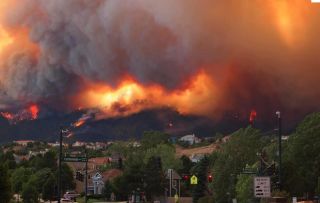It’s official: 2012 was the warmest year recorded in the U.S.It was also one of the most extreme, with unusual weather events occurring more frequently, and thus even more unusually.
How do we respond to this, psychologically? It seems likely that denial will become less of an option. See, for example, the Sydney Morning Herald’s article on Australian responses to widespread heat waves, drought, and wildfires. It will be a sign of hope if the reality of climate change becomes more widely accepted and less politically divisive.
But another pitfall is fatalism. Too many stories stressing the negative state of the climate may lead to a depressed acceptance that this is the new normal. “Oh well, we ruined the environment. What a shame. Nothing we can do about it now.” In fact, there is plenty we can – and should – do to turn things around.
There’s a place for optimism. But there’s also a place for defensive pessimism. Julie Norem developed this idea to describe the people for whom the thought of negative outcomes is a motivation, inspiring them to work to avoid the worst.
In addition to the news about 2012’s record-breaking status, another story this past week was the virulent flu season – the worst for several years.

The appropriate response, all the experts said, is to get a flu shot. It’s not too late.
We need to be aware of the serious threats to global climate. But we need to remember that we can take corrective action. Optimism or pessimism, whatever it takes to motivate change.


